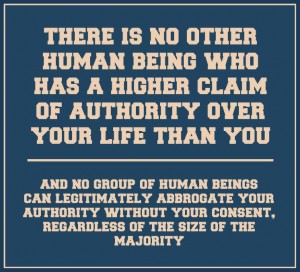 I constantly get harassed on Facebook by corporatist people who claim you cannot challenge jurisdiction using such resources as Section 32 and that the prosecutor has authority to charge you based on the fact that they wrote in a book somewhere that they can. Wow! I even had difficulties writing that fallacious circular argument.
I constantly get harassed on Facebook by corporatist people who claim you cannot challenge jurisdiction using such resources as Section 32 and that the prosecutor has authority to charge you based on the fact that they wrote in a book somewhere that they can. Wow! I even had difficulties writing that fallacious circular argument.
Let me start by pointing out to all the people out there who call watching videos on YouTube “research” that there is this thing in every state and province called Rules of Procedure. Now although I don’t typically follow the state scripts, if you intend on entering the arena called the court system you must do so following there rules. The basics of which are explained very clearly in Jurisdictionary which is why I like it so much.
But to get to the point anyone can challenge the authority (jurisdiction) and cause of action of the person bringing a claim against them, typically by a crown or state prosecutor. In the province of Ontario rule 21 states in full:
RULE 21 DETERMINATION OF AN ISSUE BEFORE TRIAL
WHERE AVAILABLE
To Any Party on a Question of Law
21.01 (1) A party may move before a judge,
(a) for the determination, before trial, of a question of law raised by a pleading in an action where the determination of the question may dispose of all or part of the action, substantially shorten the trial or result in a substantial saving of costs; or
(b) to strike out a pleading on the ground that it discloses no reasonable cause of action or defence,
and the judge may make an order or grant judgment accordingly. R.R.O. 1990, Reg. 194, r. 21.01 (1).
(2) No evidence is admissible on a motion,
(a) under clause (1) (a), except with leave of a judge or on consent of the parties;
(b) under clause (1) (b). R.R.O. 1990, Reg. 194, r. 21.01 (2).
To Defendant
(3) A defendant may move before a judge to have an action stayed or dismissed on the ground that,
Jurisdiction
(a) the court has no jurisdiction over the subject matter of the action;
Capacity
(b) the plaintiff is without legal capacity to commence or continue the action or the defendant does not have the legal capacity to be sued;
Another Proceeding Pending
(c) another proceeding is pending in Ontario or another jurisdiction between the same parties in respect of the same subject matter; or
Action Frivolous, Vexatious or Abuse of Process
(d) the action is frivolous or vexatious or is otherwise an abuse of the process of the court,
and the judge may make an order or grant judgment accordingly. R.R.O. 1990, Reg. 194, r. 21.01 (3).
MOTION TO BE MADE PROMPTLY
1.02 A motion under rule 21.01 shall be made promptly and a failure to do so may be taken into account by the court in awarding costs. R.R.O. 1990, Reg. 194, r. 21.02.
FACTUMS REQUIRED
1.03 (1) On a motion under rule 21.01, each party shall serve on every other party to the motion a factum consisting of a concise argument stating the facts and law relied on by the party. O. Reg. 14/04, s. 15.
(2) The moving party’s factum shall be served and filed with proof of service in the court office where the motion is to be heard at least seven days before the hearing. O. Reg. 394/09, s. 5.
(3) The responding party’s factum shall be served and filed with proof of service in the court office where the motion is to be heard at least four days before the hearing. O. Reg. 394/09, s. 5.
(4) Revoked: O. Reg. 394/09, s. 5.
Now that is a lot to absorb and, based on traditional blog guidelines, is way out of control, but the fact is if you wish to “play the game” then you need to be able, ready and willing to read and comprehend this type of information. Simply stated it says that anyone can challenge the cause of action brought against them and the jurisdiction of the court. I’d like to point out here that challenging the jurisdiction of the “court” is typically a losing proposition. Challenging the authority / cause of action of the prosecutor will always get you the win as there is almost never a valid cause of action and thus no defense for the accused.
I also recommend while studying the “rule of law” that you also study the Maxims of Law and Equity. When you bring a case into the court you MUST strive to avoid using statutes and keep everything on the, as it’s called here in Ontario, inherent jurisdiction. Statutes are simply rules of a society and that brings in a whole new element of law that I will avoid for now. They can be used in common-law courts but care must be exercised.
Summary
In summary you can always challenge the authority of your accuser to bring charges against you. There must be a valid cause of action and there must be a defence. The typical “cause of action” in traffic violations are that you are operating as an agent of the “state” and that you are required to obey their traffic act regulations. This is true if you are a city bus driver on duty or other government agent operating their vehicle but it is never true if you are merely going about your private business in your private vehicle.
This is the issue you need to attack when defending in traffic court. Never argue issues of “I’m not the name” or “the court only has jurisdiction over the name and not the man” as these are fallacious and illogical statements. The court has the jurisdiction to hear any matter brought before it regarding traffic issues. The point is that there is no contract that can be brought forth to prove that you were operating as an agent of their corporation at the time of the incident and thus no valid cause for the prosecutor to bring the matter before the court.
I hope that makes sense to you. If you don’t live in Canada and don’t have a section in their corporate charter to point to then you need only use logic and if you research local case laws you will find where this has been fought and won in the past should you desire it. Fight the matter where the fight is occurring and you WILL win. This is the lessons of Jurisdictionary.
Until next time I wish you all peace and blessings,
Rob





